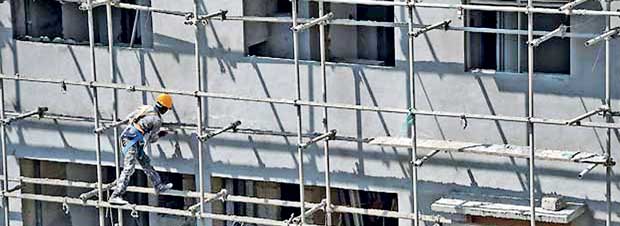Reply To:
Name - Reply Comment

By Chandeepa Wettasinghe
The Central Bank appears to have succeeded in its efforts at curbing the ‘irrational exuberance’ of property developers, with a slowdown being now witnessed in apartment construction amid fears of a possible property bubble.
“After the Central Bank’s warnings and that it may even limit credit to construction and property development, there has been a slowdown in construction of ongoing projects. Some have even halted construction. Our business is falling,” a component supplier for apartment projects told Mirror Business under the condition of anonymity.
This is despite Chamber of Construction Industries Sri Lanka Secretary General/CEO Nissanka Wijeratne saying that the number of apartment construction projects currently active has reached over 60. This March he had placed the number at 49.
A look at the country’s external sector, as most of the construction materials are imported, shows that brakes are being applied in the construction industry, despite the resumption of large scale projects such as the construction of expressways, which were in limbo during the last year.
Import expenditure in the four months of this year which had totalled US$ 524.1 million, growing 8 percent year-on-year (YoY) had by the end of the first half of the year has slowed down to US$ 789.6 million, growing 3.8 percent YoY, following a 0.3 percent YoY fall in imports during May and a 6.8 percent YoY fall in June.
Local input manufacturers, such as ACL Cables PLC and Kelani Cables PLC too saw a dip in their sales to clients outside their groups during the first financial quarter this year.
Mirror Business reliably learns that the Central Bank is satisfied with the new development, as it had hoped for the industry to slow down apartment developments by itself following moral suasion, instead of forcing the Central Bank’s hand to bring in corrective measures.
Following cautions issued throughout this year, the Central Bank and the Finance Ministry had jointly written to the International Monetary Fund in June saying that they were prepared to apply macro prudential corrective measures such as loan-to-value ratios for the construction and property development industries to protect the country’s financial system.
Sri Lanka’s financial institutions have lent to both the developers to build the apartment, and mortgages for buyers to purchase apartments.
Although credit extended to the property sector had been at its highest over the past three years, developers had argued against the existence of a bubble by stating that only 10 percent of apartment purchases were backed by loans.
However, the Central Bank’s worries that loans taken for other purposes being exposed to the property sector was validated as it was recently revealed that small and medium scale enterprises (SMEs) have been purchasing apartments with cash, based on speculations that they would realize capital gains by selling the apartments for higher prices in the future.
In order to meet the cash shortage in the balance sheets of these companies, they had taken SME loans.
State banks were prolific in recent months in SME lending according to the Central Bank. This has resulted in high private credit growth for the second year in a row despite private banks showing a greater responsiveness to the current high interest rate regime.
It is not yet clear whether larger companies have added apartments to their portfolio of investments based on speculation. There have also been concerns over black money being laundered through apartment sales.
The time lag between demand and the time to construct apartments has resulted in an oversupply of apartments entering the market when demand has fizzled out. Recently, both the Central Bank and property developers confirmed that demand in the luxury apartment segment had halved.
Instead of oversupply resulting in lower pricing, the speculation of further demand—or ‘irrational exuberance’ as Former US Fed Chair Alan Greenspan termed—has resulted in asset prices appreciating to unrealistic levels, deviating far from projections based on a historical average.
Wijeratne said that with the slowdown in demand, there are risks of small scale, relatively unknown developers not completing projects.
“In some other countries, without access to total funds developers can’t go ahead with construction but here, a lot of people are trying to put up 5-storey buildings, trying to finance them through advances from prospective clients. If they can’t pre-sell, they get stuck. In the end the clients are left high and dry,” he said.
Ratings agency Fitch too had warned over the proliferation of uncompleted property development projects in Colombo.
Wijeratne said that super-luxury developers, especially from overseas are liquid enough that they can afford to construct and wait for purchases, but the mid-range luxury apartments selling at around Rs.30 million are not selling fast.
The mid-range developers argued the opposite this May when attempting to debunk Central Bank warnings.
Distorted information has been a key concern and the Central Bank is now engaging more closely with developers to gain the most accurate picture.
Wijeratne said that most people could afford middle-class apartments costing around Rs. 5-7 million, and that the mid-range prices should be corrected, since not many can afford that.
“It needs some re-pricing. The government should concentrate on how they can bring the prices down,” he said.